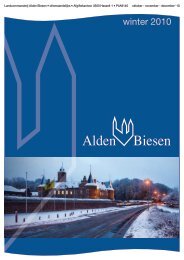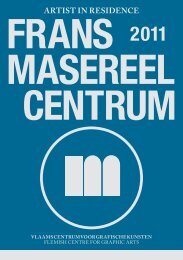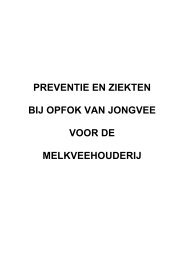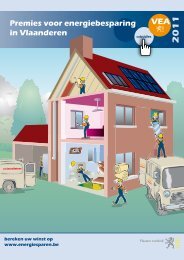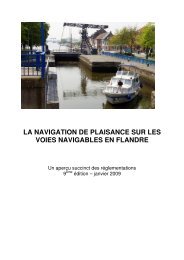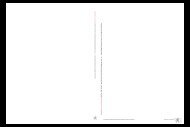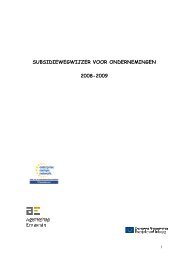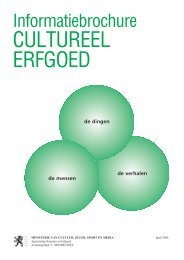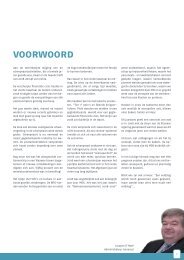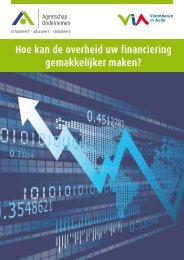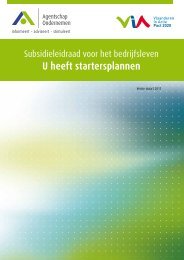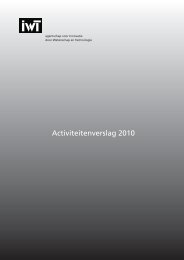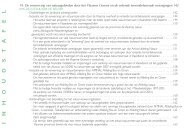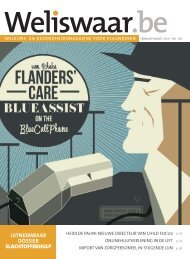Acknowledgements Book of abstracts - Publicaties - Vlaanderen.be
Acknowledgements Book of abstracts - Publicaties - Vlaanderen.be
Acknowledgements Book of abstracts - Publicaties - Vlaanderen.be
You also want an ePaper? Increase the reach of your titles
YUMPU automatically turns print PDFs into web optimized ePapers that Google loves.
Pazotboum Arouna Ouedraogo presents Poster 89 during the poster sessions in the Aula.<br />
Session theme 7: Stakeholders' views on animal welfare<br />
161<br />
Poster 89<br />
FRENCH STAKEHOLDERS’ ATTITUDES TO SURGICAL CASTRATION<br />
OF PIGS AND ALTERNATIVES<br />
1 INRA<br />
2 CNEVA (France)<br />
A.P. Ouedraogo 1 , A. Prunier 1 , V. Courboulay 2 , M. Bonneau 1<br />
Surgical castration <strong>of</strong> piglets embodies genuine welfare issues: it is painful and it entails painful<br />
physical manipulations. However, this a routine practice now in the horizon <strong>of</strong> pr<strong>of</strong>essional cultures<br />
and national or regional traditions all over Europe, with the result that dealing with it in the<br />
perspective <strong>of</strong> the animals’ welfare reveals to <strong>be</strong> a tough matter. This paper, originated by research<br />
undertaken in the frame <strong>of</strong> a Specific Support Action in the 6th Framework Programme <strong>of</strong> the EU<br />
and called PIGCAS (for Pig castration), aims at analysing the French stakeholders’ attitudes to pigs’<br />
welfare in the frame <strong>of</strong> castration issues. Stakeholders concerned with the PIGCAS study include<br />
pig producers (both main stream and niche producers), feed companies (including breeding<br />
companies, slaughterhouses and meat industries, and wholesalers), administration (including<br />
Government and Public bodies), Veterinarians (mainly commercial ones), consumers and retailers,<br />
and animal welfare NGOs.<br />
On the whole, when the opinion <strong>of</strong> the European stakeholders is considered, surgical castration with<br />
anaesthesia is the <strong>be</strong>st option for consumers, followed by raising only females. NGOs’ <strong>be</strong>st option<br />
was raising entire males and the less preferred option surgical castration without anaesthesia. For<br />
the producers (main stream) surgical castration with or without anaesthesia are the most preferred<br />
options. However producers’ (niche) most preferred option was surgical castration with anaesthesia<br />
and raising only females and immunocastration the less preferred. The Government stakeholder<br />
presented higher scores for surgical castration with anaesthesia and lower scores for surgical<br />
castration without anaesthesia. Slaughter plants’ <strong>be</strong>st option was surgical castration with<br />
anaesthesia and immunocastration was the worst option. Finally veterinarians presented higher<br />
scores for surgical castration with anaesthesia.<br />
However, the smallness <strong>of</strong> the sample <strong>of</strong> surveyed stakeholders did not help much to get an insight<br />
on the determinants <strong>of</strong> stakeholders’ attitudes towards alternatives to surgical castration.<br />
Consequently, we are undertaking semi-structured interviews mainly with mainstream pig<br />
producers and animal welfare NGOs (n=15) with the purpose <strong>of</strong> drawing an exhaustive picture <strong>of</strong><br />
the determinants and/or constraints which make intelligible the stakeholders’ attitudes to the<br />
different alternatives to surgical castration.<br />
Contact information: Pazotboum Arouna Ouedraogo or email arouna.ouedraogo@ivry.inra.fr<br />
Complete address: INRA-ALISS, 65 Boulevard de Brandebourg 94205 Ivry/Seine, France<br />
Species: Pig



